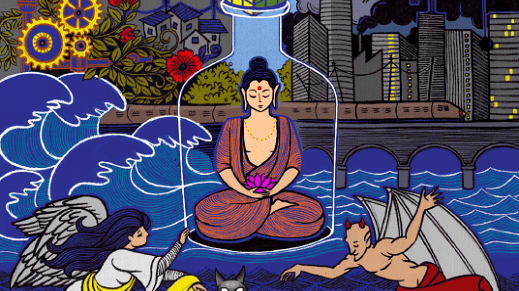The pursuit of hygge during COVID-19 social distancing has forced the Tsundoko-afflicted to dust off the books in their homes, and prompted busy readers to boost e-book sales worldwide. With Amazon shifting its attention to ‘essential goods and services’ and independent bookstores suffering due to reduced footfall, digital publishing platforms and reading services are flourishing globally. According to Emma Charlton, fiction sales in the United Kingdom have had a 30% increase while sales of children’s non-fiction titles surged by 66% in the United States. Even as digital libraries such as Internet Archive and JSTOR have provided access to millions of books and journals, Seagull Books is offering a book a day to readers worldwide. The million-plus subscribed Scribd has also pitched in with free access to its library.


Although the COVID-19 lockdown has positively impacted the global e-book industry, publishing startups have been re-drawing the boundaries of the traditional printing press and conventional publishing houses for years.

My VLF, winner of Bookseller’s FutureBook Booktech Startup of the Year, is the global online literary festival. Launched in 2019 by The Blonde Plotters, Gwyn GB, Kelly Clayton, Deborah Carr, who found travelling to literary festivals expensive from their residence in Jersey in the Channel Islands near France, My VLF provides free access to thousands of books and author interviews, similar to a venue-based literary festival. Co-founder of My VLF, Gwyn GB says, “Although the award has not made much difference in registered users since it’s an industry award, the recognition has prompted new publishers and authors to get in touch with us.” The Covid 19 lockdown has also brought collaborations with publishers who had scheduled book launches, and cancelled British book festivals coming together for My VLF’s Big Book Weekend.

As with most startups, gaps in industry paradigms often precipitate identification of technological solutions. My VLF is similar to Notion Press which was established when engineers, Naveen Valsakumar and Bhargava Adepalley were unable to find a publisher despite friend Jana Pillay’s father owning a publishing house. According to Publishizer’s Lee Constantine, “96% of book proposals get rejected by agents and publishers… And many authors are left to navigate this process on their own… So Publishizer started as a way for authors to crowdfund their own advance by selling pre-order copies… All of these happens before the book is written, so it’s a very lean approach to publishing a book.”

Among start-ups taking the unconventional route in the publishing industry is Qwerty Thoughts. The social book-reading platform’s discussable format of a book enables readers to simultaneously interact with the text and other readers. Co-Founder of Qwerty Thoughts, says, “Every book is a virtual reading room. We have incorporated chat rooms plus live reading. So while you are reading, you can see who all are reading a book at that particular time. You can directly chat with them inside the book; and if you’re reading the same chapter, you can directly have a live chat on that particular chapter or that particular paragraph even which you are reading together”.

The range of publishing startups include publishing start-up veteran, Pothi.com, crowdfunding publisher Unbound, and photobook printer Binder. Co-Founder of Canelo, Michael Bhaskar’s list of publishing startups includes more than 500 companies worldwide. While many companies on Bhaskar’s original 2014 list have remained active, companies like Red Lemonade found it difficult to continue operations. Richard Nash of Red Lemonade, who was unable to raise the capital necessary for business development, explains that “One of the biggest challenges that publishing start-ups face in the East and the West is adoption cycles. It takes a very long time for publishing start-ups to scale… Any investor, they want to see activity on the platform.”

B2B publisher and founder of photobook publisher, Binder, Shubhojit Chatterjee agrees that it is more difficult to retain consumer clients than business clients. Citing Pothi.com as an example of how long it takes to establish a publishing start-up, Shubhojit says, “customer relationship management is really important. Whenever a customer has an issue, we ensure we respond immediately to address their concern… And customers remember that we went the extra mile to resolve their issue.”

Among the first Print-on-Demand companies in India, Pothi.com, has come a long way since it was established in 2008, with nearly 12000 print titles and 8000 e-books presently. Co-founder Abhaya Agarwal attributes the platform’s success to “word-of-mouth publicity. We have always prided ourselves on our customer service and transparency. Because self-publishing can be a very scammy thing… There are tons of companies making huge promises and charging large amounts. So we have always been very careful. we can under-promise and over-deliver but never the other way around.” Abhaya is also proud of being able to provide opportunities to unconventional authors including graphic novel illustrators through the Comix India collaboration.
Of course, Amazon, the tech behemoth that started the publishing disruption, is still going strong with “authors earning more than USD 300 million from the Kindle Direct Publishing (KDP) Select Global Fund in 2019, totalling more than USD 1.1 billion since the launch of Kindle Unlimited.” As Brian Heater & Anthony Ha assert, “Kindle can take credit for doing the lion’s share in changing our perception of what a book is.” As more publishing start-ups try to re-define the reading and publishing experience worldwide, the modern printing press of digital libraries and independent publishing is expected to incorporate more technological solutions that blend existing printing standards with innovations for the narrative of digital humanities.






